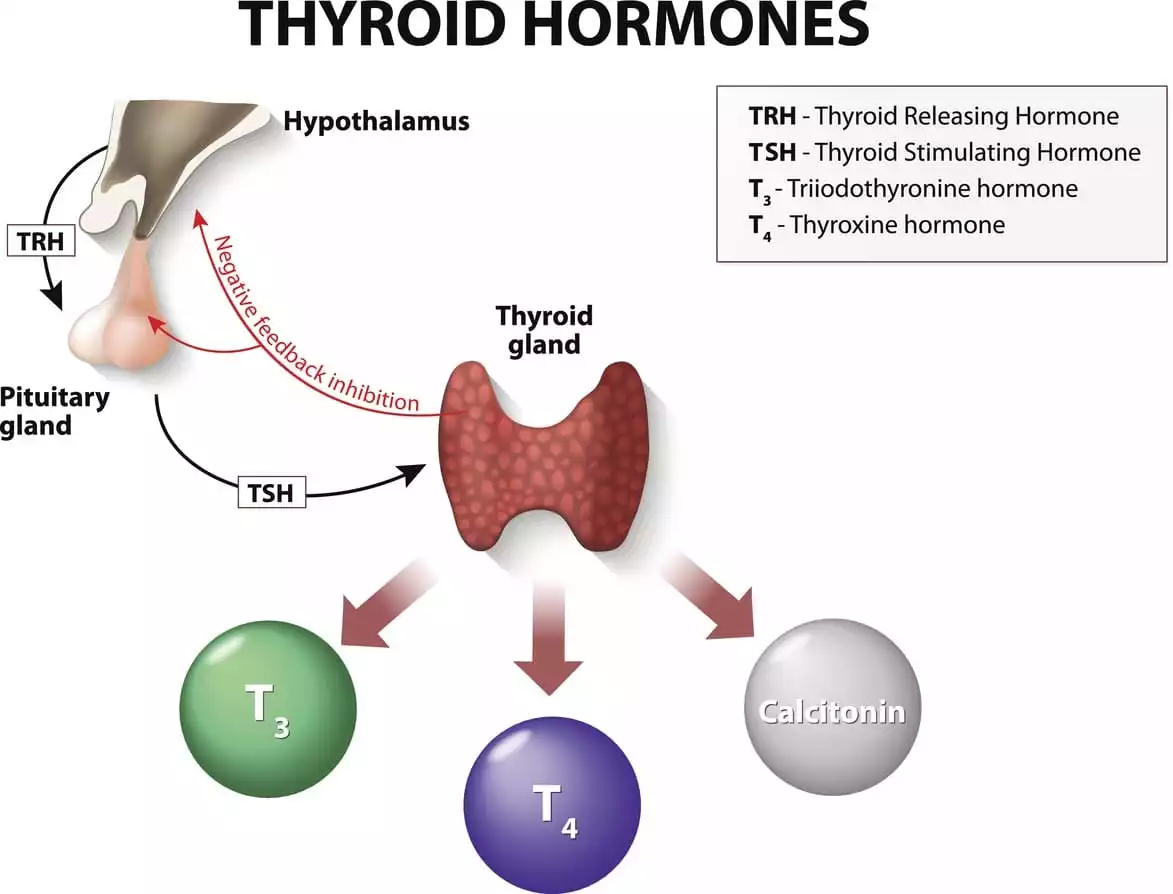
Thyroid conditions are fairly common, and with the proper medication, can be treated; but what are the benefits and the side effects of thyroid medication?
Around 12 percent of all Americans will develop some kind of thyroid condition throughout their lives. Ranging from simple hypothyroidism to more complex illnesses, like Hashimoto’s Disease, these conditions can cause disabling symptoms like extreme fatigue, heart palpitations, and intense anxiety.
Left untreated, this can eventually turn into total thyroid failure or a condition known as “thyroid storm,” which can result in death.
The good news is that we have good options for treating thyroid conditions in the modern world. Unfortunately, finding the right treatment isn’t always straightforward.
First, doctors need to identify which type of disorder is at play; then, blood testing can help them to choose which drugs are the most likely to re-balance the thyroid.
In this post, we’ll tell you how you can recognize if you may be suffering from a thyroid condition, including the signs and symptoms.
We’ll also talk about the benefits and side effects of thyroid medication and the differences between compounding and commercial branded medications.
Do I Have A Thyroid Condition?
Detecting a thyroid condition isn’t always easy.
Depending on the patient, symptoms may be confused for other illnesses. These symptoms include:
- Fatigue
- Exhaustion
- Sweating
- Weight gain
- Racing heart
- Heart palpitations
However, all are textbook examples of the symptoms many thyroid patients experience every single day.
There are two “main categories” for thyroid-related illnesses:
- Hypothyroid (meaning the thyroid produces too few hormones)
- Hyperthyroid (meaning the thyroid produces too many hormones).
Both can be equally dangerous in the right circumstances; however, hyperthyroid is much more impactful on the heart. This is why many patients experience cardiac symptoms like palpitations.
Let’s take a look at hypothyroid and hyperthyroid symptoms specifically.
Symptoms of Hypothyroid
Hypothyroid describes a condition where the thyroid does not produce enough hormones.
This can be due to genetics or autoimmune disease. Rarely, it is a side effect of certain medications.
The most common symptoms include:
- Deep, constant exhaustion
- Feeling cold all the time
- Constipation
- Dry, flaky skin
- Gaining weight
- Edema (swelling)
- Voice cracking or hoarseness
- Feeling weak (e.g., lost grip strength)
- Extremely high cholesterol levels
- Chronic muscle pain, including allodynia (tender to touch)
- Stiffness in the joints (knees, spine, or wrists)
- Heavy menstrual periods
- Feeling depressed
- Brachycardia (slow heart rate)
- Chronic “brain fog” or memory loss
Symptoms of Hyperthyroid
Patients with hyperthyroid syndrome have a thyroid gland that overproduces hormones instead.
This causes the body’s natural metabolism and most symptoms to effectively “speed up.” It, too, can be genetic or a result of autoimmune diseases.
The most common symptoms include:
- Anxiety and/or panic attacks
- Feeling nervous all the time
- High resting heart rate
- Heart palpitations (PVCs)
- Feeling hot or sweaty all of the time
- Trembling and/or shaking
- Losing weight rapidly, especially if constantly hungry
- Diarrhea and/or bowel cramping
- Pretibial myxedema (a thick, scaly redness on the legs)
- Odd nail bed presentation (ridges, holes, or spots)
- Fragile or extremely dry skin (especially on the hands)
- Dysmenorrhea (lack of menstrual periods)
- Insomnia (often severe)
Treating Thyroid Conditions
As previously mentioned, it isn’t always easy to treat thyroid conditions.
Because even a slight variation in dose can make all the difference, and because every patient’s physiology is unique, treatment is often a process of measuring the blood and trying medications until you find the right one.
Most patients have two options for treating thyroid conditions. These include:
1. Commercial medications (branded products available in a specific dose) or;
2. Compounded medications (base ingredients mixed by your pharmacist to your custom needs).
Some of the most common options include:
- Synthroid®, a commercially-available synthetic replacement drug
- Armor Thyroid®, a porcine-sourced “natural” thyroid drug
- Propylthiouracil (PTU), a commercial synthetic hyperthyroid drug
- Tapazole, a commercial synthetic hyperthyroid drug
- Compounded combinations including bioidentical versions
Next, we’ll tell you about the benefits of taking thyroid medications, the risks and side effects of thyroid medication, and what you need to know about compounded drugs.
The Benefits of Taking Thyroid Medication
Both commercial medications and compounded medications can be remarkably effective.
Once patients find the right option, maintenance becomes as easy as occasionally monitoring the blood and adjusting dose as your condition changes.
Taking medication for a thyroid condition can produce remarkable results.
Because the nature of most thyroid disorders is that the thyroid produces the wrong amount of hormone, medications that replace or remove the hormone unbalanced do have the potential to almost totally remove symptoms.
The key lies in finding the right one.
Treating thyroid conditions is beneficial for numerous reasons.
It can stabilize your blood pressure, protect your heart and cardiovascular system, and make you feel “well” again.
For patients who struggle with mental health issues (like anxiety) as a result of thyroid problems, these symptoms often reverse quickly, too.
Side Effects of Thyroid Medication
The thyroid is one of the most important glands in the body. The hormones it produces (T3 and T4) influence nearly every other part of your body.
Therefore, if they become even slightly unbalanced, you will become sick.
Most side effects of thyroid medication are a result of the medication tipping the balance too far in the opposite direction.
Dosing Too High
For example, if a patient with hyperthyroid starts a new medication based on old blood work, it may be too strong for their current needs.
The side effects of thyroid medication, if not properly balanced, is that the thyroid will begin overworking instead of under-producing.
Hypothyroid patients develop symptoms of hyperthyroid, while hyperthyroid patients develop symptoms of hypothyroid instead.
Dosing to Low
Similarly, dosing too low can also fail to produce symptoms.
Sometimes, this is a true issue of the dose being too low. In other cases, it is a result of the patient failing to absorb the medication fully, and thus, only effectively receiving a partial dose.
This is much, much more common with synthetics rather than bioidenticals.
Bioidentical Thyroid Hormones
Bioidentical hormones for the thyroid are generally compounded medications that contain hormones molecularly identical to the hormones your own thyroid produces.
These medications are often naturally-sourced (from pork products or certain plants) rather than being synthetic or chemically-created.
These drugs are typically used to treat resistant hypothyroid disease in patients who, for whatever reason, simply don’t seem to respond to standard synthetic drugs.
Researchers believe the body may have an easier time recognizing them, which may create less side effects of thyroid medication than synthetic medications.
Bioidenticals are not necessarily “better” than synthetic drugs; they are just another option. Your doctor and pharmacist can help you decide which is right for you.
Compounding Thyroid Medications
Compounding pharmacies work with thyroid patients every single day. But what exactly is compounding – and how can it help you?
Compounding is defined as the process of putting together base ingredients to create a custom version of a medication.
- For example, if your doctor orders steroid cream for you, your pharmacist may mix powdered or liquid steroid drugs with a base cream and then deliver it to you in a small jar.
- Or, they may add flavoring to a medication to make it taste better. It even includes re-formulating pills to topical creams!
In the case of thyroid treatment, compounding is extremely helpful.
Because the pharmacist has the ability to work with base ingredients, they aren’t forced to adhere to a commercially-regulated list of doses.
Instead, they can make micro-adjustments to find the right balance of medicine that doesn’t cause further side effects of thyroid medication.
How Does This Help?
Here’s an example: let’s say your doctor prescribes you 50 mg of Synthroid for hypothyroid disease.
You take the medication, but develop symptoms of hyperthyroid, so your doctor drops the dose to 40 mg.
However, this dose isn’t enough to treat your true hypothyroid condition.
A 45-mg pill may not be available on the commercial market, but your pharmacist can create it for you specially through compounding.
Conclusion
Have further questions about benefits, types, or side effects of thyroid medication?
Speak with your pharmacist.
Achieving wellness is possible with the right treatment and medication protocols.
Your local pharmacy is your best guide in finding a way to move forward.

 info@burtsrx.com
info@burtsrx.com



I will definatly ask my pharmacist about the side effects of levothyroxine when I go to pick up my meds. Thanks! Annmarie Zima
You are welcome Annmarie! Don’t hesitate to reach out if you have any questions!